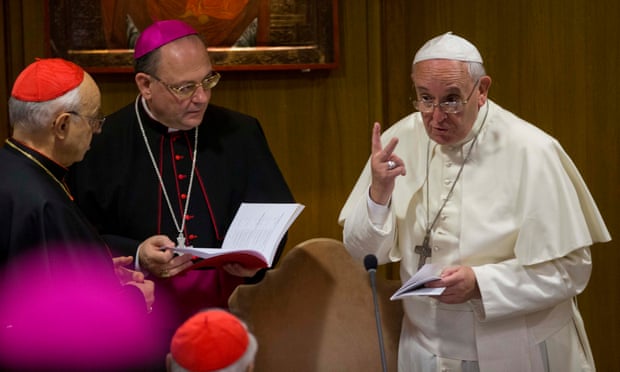
For a church with a 12th-century mindset, the 21st century is a bewildering place.
On Sunday, bishops from all around the world will descend on Rome and begin a contentious debate about how the Catholic church ought to confront the changing dynamics of the modern family, while not veering away from the doctrine that has ruled the institution for centuries.
The bishops who are attending the three-week synod on the family, as it is known, are expected to debate issues ranging from how to deal with the prevalence of divorce, to ways to counsel young couples who live together but do not want to get married, to how to recognise the children of same-sex couples.
“It’s about how the church can better walk alongside people,” says Austen Ivereigh, a Vatican expert who has written a biography on Pope Francis. “Now that doesn’t mean accepting that co-habitation is right. But it might be accepting that it is a stage to marriage.”
For some staunch conservatives, such as the US cardinal Raymond Burke, the synod has raised the possibility that there could be attempts to whittle away at church doctrine – such as the indissolubility of marriage – that may be out of kilter with modern life.
Conservatives are preparing to do battle with more progressive voices, led by the German cardinal Walter Kasper, who have put forward ideas about the church being more inclusive, like allowing some divorced and remarried Catholics to receive communion after a period of penance.
The bishops on both sides of the divide – those seeking to staunchly adhere to doctrine, and those looking for the church to adopt an approach that might welcome people who feel otherwise excluded – are even fighting over the schedule of when issues will be debated.
Noting that the majority of contentious issues will be raised during the last week of the ecclesiastical gathering in Rome, the conservative deacon Nick Donnelly points out in a “survivor’s guide to the synod”, published by the National Catholic Register, that this is a “well-known ploy … used by leftwing militants attempting to impose their agenda on the group” because it was the period when participants would be “fatigued and jaded”.
He predicts there will be an early attempt to take a page out of “progressives playbook” and change the schedule.
The question of how the church responds to the pastoral needs of remarried Catholics is one of the more politicised issues the synod will grapple with. But there are others, such as whether Catholics should get more pre-marriage counselling to enhance understanding of what marriage means, which the pope recently called “one of the most difficult things”.
Among top worries for conservative Catholic groups, such as Voice of the Family, is that the document that serves as a starting point from where the debate will begin – known as the Instrumentum laboris – could soften the church’s approach to marriage, including being more open to same-sex unions and altering its stance on IVF.
This synod represents a break from previous ones. Usually such meetings concluded with a presentation of proposals by bishops to the pope, who would then issue a document a year later. But in this case, Francis has indicated that will not happen. The Vatican said on Friday the bishops would vote on a document that summarised their discussions at the conclusion of the meeting. The synod ends on 24 October.
“It’s much more dynamic and open ended, and people are not yet sure how it will turn out,” says Ivereigh.
The synod is also important, he notes, because it reveals the global church in action and all the cultural issues that entails.
In the last synod on the family, which met last year and was considered Part I of this imminent Vatican summit, it was evident that bishops showed the most compassion for the situations they were most familiar with.
“Some of the Africans wanted a much more pastoral approach to polygamy – they were saying what do you do when a man converts and does not want to subjugate four wives to a life of poverty? In the same way, Europeans were talking about the realities of same-sex relationships,” sayd Ivereigh. “They are trying to do something that is really almost humanly possible, which is to come up with a unified pastoral strategy on marriage for the world, despite enormous cultural differences.”
Pope Francis seemed to have the approaching synod in mind last week when he discussed how difficult it can sometimes be to have a family. The church is his.
Speaking off the cuff in Philadelphia, the pontiff said: “Couples sometimes argue, and even plates can go flying. Children can be headaches. I won’t even talk about mothers-in-law.”
Ultimately, Ivereigh says, Francis is looking for church leaders to adopt a more “pastoral approach”. That was at the heart of Francis’s speech before bishops in Philadelphia, when he said: “A Christianity which does little in practice, while incessantly explaining its teachings, is dangerously unbalanced.”

No comments:
Post a Comment